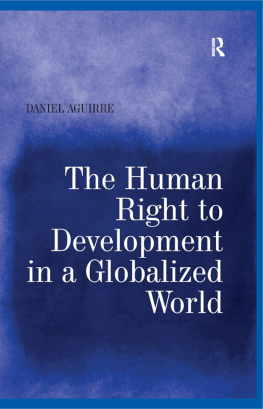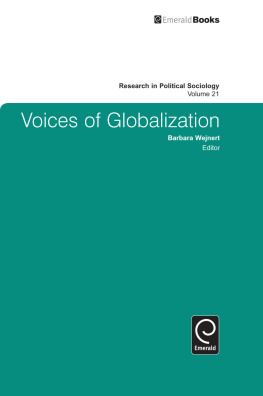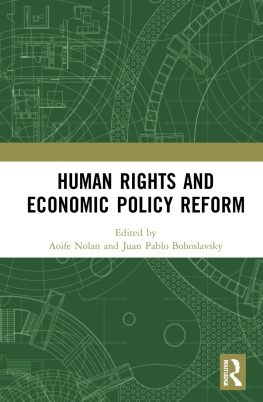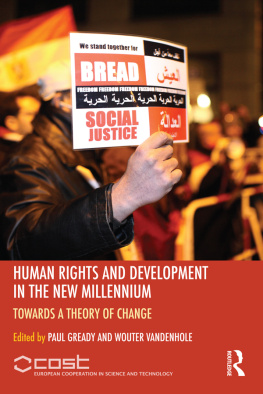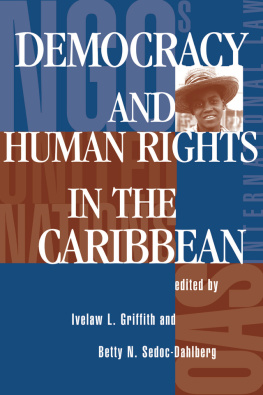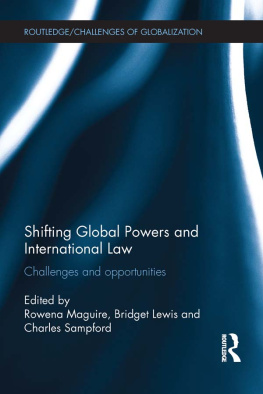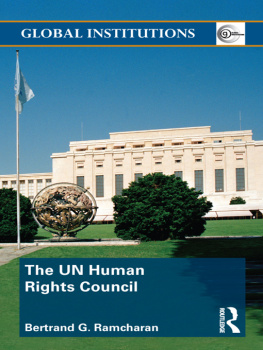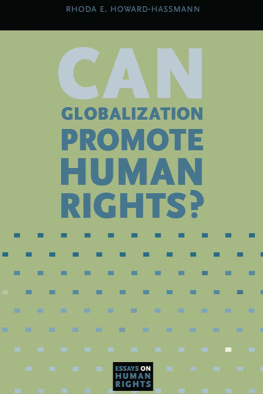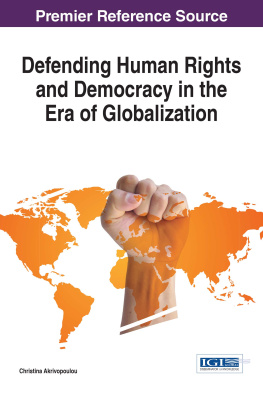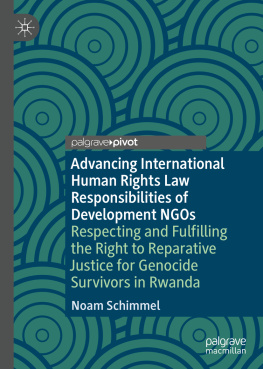THE HUMAN RIGHT TO DEVELOPMENT IN A GLOBALIZED WORLD
This book is dedicated to my parents
Kevin and Pauline Aguirre
The Human Right to Development in a Globalized World
DANIEL AGUIRRE
First published 2008 by Ashgate Publishing
Published 2016 by Routledge
2 Park Square, Milton Park, Abingdon, Oxon OX 14 4RN
711 Third Avenue, New York, NY 10017, USA
Routledge is an imprint of the Taylor & Francis Group, an informa business
Copyright Daniel Aguirre 2008
Daniel Aguirre has asserted his moral right under the Copyright, Designs and Patents Act, 1988, to be identified as the author of this work.
All rights reserved. No part of this book may be reprinted or reproduced or utilised in any form or by any electronic, mechanical, or other means, now known or hereafter invented, including photocopying and recording, or in any information storage or retrieval system, without permission in writing from the publishers.
Notice :
Product or corporate names may be trademarks or registered trademarks, and are used only for identification and explanation without intent to infringe.
British Library Cataloguing in Publication Data
Aguirre, Daniel
The human right to development in a globalized world
1. Human rights 2. Globalization 3. Economic development
I. Title
303.44
Library of Congress Cataloging-in-Publication Data
Aguirre, Daniel.
The human right to development in a globalized world / by Daniel Aguirre.
p. cm.
Includes bibliographical references and index.
ISBN 978-0-7546-7471-9
1. Economic development. 2. Globalization--Economic aspects. 3. Human rights. I. Title.
HD75.A37 2008
338.9--dc22
2008018467
Transfered to Digital Printing in 2011
ISBN 9780754674719 (hbk)
Contents
There are many friends and colleagues that I would like to acknowledge for their assistance and support during the course of my research. Firstly, I would like to thank the Irish Centre for Human Rights and the National University of Ireland for providing an amicable venue for research and learning. I extend my gratitude to Prof. Joshua Castellino, Dr Kathleen Kavanaugh, Dr Vinodh Jaichand, Dr Raymand Murphy and the rest of the staff for all their fine work. In particular, I wish to thank Prof. William A. Schabas for his invaluable insight. Thanks also to Bruce Porter and Prof. Koen De Feyter for their comments, advice and ideas. In addition, Dr David Keane and Irene Pietropaoli provided important editing and helpful advice. I wish also to tip my hat to all those who granted me unwavering friendship in Galway and Port Elgin, Ontario. Your support was essential to this long process. Finally, I wish to thank my parents, to whom this book is dedicated.
One of the most profound challenges that we face as a community of nations is to understand better the emerging socio-economic forces and forms of globalization, to shape them to serve our needs and to respond effectively to their deleterious consequences.1
The effects of globalization are resonating around the world. Developments in technology, communications and transportation have facilitated a rapid increase in transnational political, economic and social exchanges. This has affected international relations and relations between states and multinational corporations.2 Economic globalization is associated with economic interdependence, deregulation and a dominance of a liberalized marketplace. Globalization is touted as the basis of rapid development. But economic globalization has only strengthened international networks of trade and investment3 creating highly interdependent regions.4
Since the end of the Cold War, the international political economy has experienced fundamental changes.5 Cold War alliances once dominated the world economy as well as development policy. Thus markets were subjugated to political and economic security. Liberal values were not prioritized. Since then, competition between states has significantly increased. Developing states have been brought into, and now actively participate in, this competitive market-orientated international system.
Economic globalization now dominates international relations.6 Development strategy consists of liberal trading regimes with a reduced role for the state. International relations now involve states, the market, multinational corporations and international organizations.7 This globalization may make the task of fulfilling non-market goals at the national level more difficult. Specifically, the realization of the right to development, based on principles of economic self determination and global solidarity, may be impeded.8
International investment is a prominent component of economic globalization. Investments focus on profit-maximization and competitiveness can contradict the fulfillment of human rights entitlements.9 In a resolution on the question of the impact of globalization and its effect on human rights, the United Nations General Assembly recognizes that: while globalization offers great opportunities, the fact that its benefits are very unevenly shared and its costs unevenly distributed represents an aspect of the process that affects the full enjoyment of all human rights, in particular in developing countries.10
Economic globalization has increased the number and influence of multinational corporations, nearly all of which are based in G7 states.11 Of the top 500, only 29 are from low income states.12 Companies incorporated in the United States dominate the important industrial, financial and service industries.13 Of the worlds 100 largest economic entities, 51 are now corporations and 49 are countries.14 It is estimated that in 1970, there were 7,000 corporations. In 1993 there were 37,000 corporations, and by 2003, 64,000 with 870,000 foreign subsidiaries.15 The largest 500 corporations control 70 per cent of global trade and are the primary international investors. As a result of this expansion, corporate interests dominate economic globalization and influence the policy of individual states.16
The investment operations of corporations, the regulatory role of the state, and the right to development are the subject of this book. What began as research into the inadequacy of human rights law pertaining to economic globalization became a study on the unwillingness of states to fulfill their human rights obligations both domestically and internationally. After all, as Olivier de Schutter observes:
what may appear in a static analysis as a disempowerment of the states confronted with a new form of sovereignty competing with theirs is, it should be remembered, the result of the emergence of a global marketplace which is initially the creation of the states. Less than ever should we exculpate states from their alleged inability to tame the new leviathans.17
Economic globalization can produce the capital needed to provide for human rights. Human rights law can help to contain the detrimental social effects of globalization. Human rights can balance market forces within a just international political framework.18 The ability and willingness of states to discharge their human rights obligations is crucial to this system. The United Nations General Assembly emphasizes that: While globalization, by its impact on, inter alia, the role of the state, may affect human rights, the promotion and protection of all human rights is first and foremost the responsibility of the state.19 It is put forward here that the Declaration on the Right to Development sets out a national and global framework of responsibility for states to do so.

